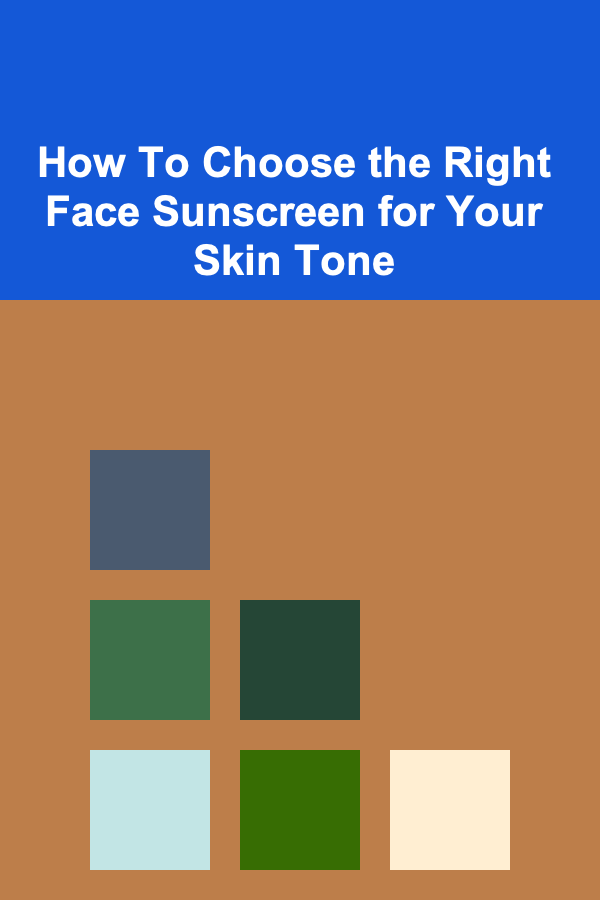
How To Choose the Right Face Sunscreen for Your Skin Tone
ebook include PDF & Audio bundle (Micro Guide)
$12.99$11.99
Limited Time Offer! Order within the next:

Choosing the right face sunscreen is an essential step in any skincare routine. Sunscreen helps protect your skin from harmful UV rays that cause premature aging, sunburns, and even skin cancer. However, many people overlook the importance of selecting the correct sunscreen based on their skin tone. This article explores why skin tone matters in sunscreen selection and offers a comprehensive guide on how to choose the best sunscreen for your unique skin type and complexion.
The Importance of Sunscreen for All Skin Tones
Before diving into how to pick the right sunscreen, it's important to understand why sunscreen is a crucial part of your skincare routine, regardless of your skin tone.
Sunscreen helps protect your skin from two types of UV radiation: UVA and UVB. UVA rays penetrate deeply into the skin and are responsible for premature aging and wrinkles, while UVB rays primarily affect the outer layers of skin, causing sunburns. Both types of rays can lead to the development of skin cancer over time.
Many people assume that individuals with darker skin tones don't need sunscreen because their melanin offers natural protection against the sun's harmful rays. While it's true that melanin provides some protection, it's not a free pass from UV damage. In fact, people with darker skin tones are still at risk of sunburn, hyperpigmentation, and even skin cancer, albeit at a slightly lower rate than lighter-skinned individuals. Therefore, everyone, regardless of skin tone, should wear sunscreen to protect their skin from the damaging effects of UV radiation.
Understanding Your Skin Tone and How It Affects Sunscreen Selection
Skin tone refers to the natural color of your skin, which can vary from fair to dark. A person's skin tone can be classified into six categories based on the Fitzpatrick scale, which measures how the skin reacts to UV exposure. This scale ranges from type I (pale, very fair skin that always burns) to type VI (very dark skin that never burns).
The Fitzpatrick scale provides useful information on how different skin tones react to sun exposure, but it also plays a crucial role in determining the type of sunscreen needed. Here's a closer look at how skin tone impacts sunscreen selection:
1. Fair to Light Skin Tones (Fitzpatrick Types I-III)
Fair to light skin tones, typically characterized by pale or light complexions, tend to be more sensitive to UV rays. People with these skin tones often burn quickly when exposed to the sun, and they are at a higher risk of developing sunburns, wrinkles, and skin cancers, including melanoma.
If you have a fair or light skin tone, it is essential to choose a sunscreen with a high SPF (sun protection factor) to provide adequate protection. A broad-spectrum sunscreen with SPF 30 or higher is recommended, and you may want to consider a sunscreen with added ingredients like antioxidants to help prevent sun damage and signs of aging.
2. Medium to Olive Skin Tones (Fitzpatrick Type IV)
Medium to olive skin tones have more melanin, which provides a higher level of natural sun protection compared to lighter skin tones. People with medium skin tones may tan more easily and tend to burn less frequently, but they are still at risk for sun damage and long-term skin issues.
For individuals with medium to olive skin tones, a sunscreen with SPF 30-50 is typically sufficient. Broad-spectrum protection is essential to guard against both UVA and UVB rays, as well as the risk of hyperpigmentation, which is common among people with medium to olive skin tones. Additionally, look for sunscreens that are non-comedogenic (won't clog pores) to prevent breakouts.
3. Darker Skin Tones (Fitzpatrick Types V-VI)
Darker skin tones are often less prone to sunburn due to the higher concentration of melanin, which provides some protection against UV rays. However, this doesn't mean that individuals with darker skin tones don't need sunscreen. UV damage can still cause hyperpigmentation, dark spots, and a greater risk of certain types of skin cancer, such as basal cell carcinoma.
Darker skin tones may require sunscreens that offer both UVA and UVB protection, with an SPF of 30 or higher. Look for sunscreens that are specifically formulated for darker skin tones, as these products often have less visible residue or white cast left behind after application. This is especially important for those who prefer sunscreens that do not leave a greasy or ashy finish.
Key Considerations When Choosing Sunscreen for Different Skin Tones
When selecting the right sunscreen for your skin tone, there are several factors to consider. These factors not only help protect your skin but also ensure that the sunscreen works well with your complexion. Here's a breakdown of the most important considerations:
1. Sun Protection Factor (SPF)
SPF is a measure of how effectively a sunscreen protects your skin from UVB rays. The higher the SPF, the more protection it offers. The American Academy of Dermatology recommends using sunscreen with at least SPF 30 for daily use, though individuals with fair skin or those who are prone to burning may benefit from higher SPF values.
For lighter skin tones (Types I-III), it's generally recommended to choose a sunscreen with SPF 30 or higher. For medium to dark skin tones (Types IV-VI), SPF 30-50 is usually sufficient. Remember, sunscreen should be reapplied every two hours or more frequently if swimming or sweating.
2. Broad-Spectrum Protection
Broad-spectrum sunscreens protect against both UVA and UVB rays. UVA rays penetrate deeper into the skin and contribute to aging, while UVB rays are responsible for sunburns. It's essential to use a broad-spectrum sunscreen because both types of rays can damage your skin in different ways.
Look for a product that specifies "broad-spectrum" on the label to ensure maximum protection. UVA rays are present throughout the day, even when the sun isn't visible, so it's crucial to use broad-spectrum sunscreen regularly.
3. Texture and Finish
The texture and finish of a sunscreen can significantly impact how it interacts with your skin tone. If you have darker skin, you may be particularly sensitive to the "white cast" that some sunscreens leave behind, which can make your skin appear ashy or pale. Mineral sunscreens containing zinc oxide or titanium dioxide are known to leave a white cast, while chemical sunscreens are typically more transparent but may not work well for sensitive skin.
To avoid a white cast, look for sunscreens specifically formulated for darker skin tones. Many modern formulations use micronized or encapsulated versions of physical blockers, which are less likely to leave a noticeable residue. Gel-based sunscreens or oil-free formulas are also great choices for those with oily skin or acne-prone skin.
4. Ingredients to Look For
When choosing a sunscreen for your skin tone, consider the ingredients it contains. Some ingredients are better suited for specific skin types or concerns. For example:
- Niacinamide: This antioxidant helps reduce inflammation, redness, and hyperpigmentation, making it ideal for people with darker skin tones prone to dark spots.
- Hyaluronic Acid: A hydrating ingredient that works well for dry or sensitive skin types, helping to retain moisture without causing irritation.
- Antioxidants (Vitamin C, E): These can help prevent oxidative damage from UV exposure and support the skin's natural defense system, reducing signs of aging and pigmentation.
5. Water Resistance
If you plan on swimming or sweating, it's essential to choose a water-resistant sunscreen. Water-resistant formulas ensure that the sunscreen stays in place for longer periods, even when you're in the water or perspiring. Look for sunscreens labeled as "water-resistant" or "very water-resistant" to ensure they will continue to protect your skin during activities that involve moisture.
6. Avoiding Irritating Ingredients
Some sunscreens contain ingredients that may irritate sensitive skin, such as alcohol, fragrances, and parabens. If you have sensitive or acne-prone skin, it's essential to choose a sunscreen that is non-comedogenic and free from harsh chemicals. Opt for mineral sunscreens with zinc oxide and titanium dioxide, which are generally gentler on the skin.
Conclusion
Selecting the right sunscreen for your skin tone is vital for maintaining healthy, youthful skin. Regardless of whether you have fair, medium, or dark skin, everyone needs to protect their skin from the harmful effects of the sun. The key to choosing the right sunscreen is understanding your skin's unique needs and selecting a formula that offers sufficient protection without causing irritation or unwanted effects.
By considering factors such as SPF, broad-spectrum protection, texture, and ingredients, you can ensure that your sunscreen suits your complexion and provides effective, lasting protection against the sun's harmful rays. With the right sunscreen, you can keep your skin safe, healthy, and radiant for years to come.

How to Create a Rotating Display for Seasonal Collections
Read More
How to Create a Sleep Sanctuary with Minimal Clutter
Read More
How to Foster Connections Between Different Family Branches
Read More
How to Optimize VR for Mobile Devices
Read More
How To Declutter Your Hobby Supplies
Read More
10 Tips for Table Tennis Mental Toughness
Read MoreOther Products

How to Create a Rotating Display for Seasonal Collections
Read More
How to Create a Sleep Sanctuary with Minimal Clutter
Read More
How to Foster Connections Between Different Family Branches
Read More
How to Optimize VR for Mobile Devices
Read More
How To Declutter Your Hobby Supplies
Read More